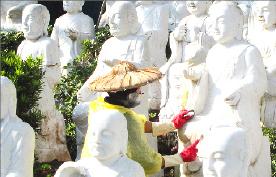More than 800 volunteers washed and cleaned 15,400 Buddha statues of varying sizes at the Fo Guang Shan Monastery in Kaohsiung on Monday, an action that senior monk Hui Chuan (慧傳) said would cleanse people’s minds as they prepare to greet the new year.
Fo Guang Shan Monastery, the largest in southern Taiwan, started the campaign to clean the Buddha statues as part of its activities to celebrate the 100th anniversary of the founding of the Republic of China.
Hsin Pei (心培), the monastery’s head monk, said Buddha, as an -enlightened being, would not care if his images were covered with dust.

PHOTO: CNA
However, the ritual and symbolic action of cleaning his statues with water could endear believers to Buddha’s body, enabling them to get rid of not only the physical dirt, but also spiritual disturbances.
Hui said the temple held an -activity two years ago asking people to bathe and clothe seniors in a filial gesture of respect.
For similar reasons, he said, bathing the Buddha statues could be seen as a way for people to cleanse their minds, giving them the peace of mind needed to obtain the wisdom to weather all difficulties and enjoy a smooth and auspicious future.
A three-story scaffold was erected on the wall of the main temple hall and volunteers passed 14,800 statues down to the ground where another group of volunteer workers cleaned them with water.
In addition, another 600 statues were taken from three other halls for the annual cleaning, bringing the total to 15,400.
Many of the volunteers hailed from Argentina and other countries, some of whom came from three generations of the same family.
Chinese tourists visiting Fo Guang Shan marveled at the grand and rare sight of so many people acting together to wash Buddha statues, and some joined the ranks of volunteers.
When their tour guides called them to return to their tour buses, they regretted having to leave so soon.
“How quickly time passes! It’s too bad. I haven’t gotten enough of this,” one Chinese tourist said.

Alain Robert, known as the "French Spider-Man," praised Alex Honnold as exceptionally well-prepared after the US climber completed a free solo ascent of Taipei 101 yesterday. Robert said Honnold's ascent of the 508m-tall skyscraper in just more than one-and-a-half hours without using safety ropes or equipment was a remarkable achievement. "This is my life," he said in an interview conducted in French, adding that he liked the feeling of being "on the edge of danger." The 63-year-old Frenchman climbed Taipei 101 using ropes in December 2004, taking about four hours to reach the top. On a one-to-10 scale of difficulty, Robert said Taipei 101

Nipah virus infection is to be officially listed as a category 5 notifiable infectious disease in Taiwan in March, while clinical treatment guidelines are being formulated, the Centers for Disease Control (CDC) said yesterday. With Nipah infections being reported in other countries and considering its relatively high fatality rate, the centers on Jan. 16 announced that it would be listed as a notifiable infectious disease to bolster the nation’s systematic early warning system and increase public awareness, the CDC said. Bangladesh reported four fatal cases last year in separate districts, with three linked to raw date palm sap consumption, CDC Epidemic Intelligence

Two Taiwanese prosecutors were questioned by Chinese security personnel at their hotel during a trip to China’s Henan Province this month, the Mainland Affairs Council (MAC) said yesterday. The officers had personal information on the prosecutors, including “when they were assigned to their posts, their work locations and job titles,” MAC Deputy Minister and spokesman Liang Wen-chieh (梁文傑) said. On top of asking about their agencies and positions, the officers also questioned the prosecutors about the Cross-Strait Joint Crime-Fighting and Judicial Mutual Assistance Agreement, a pact that serves as the framework for Taiwan-China cooperation on combating crime and providing judicial assistance, Liang

US climber Alex Honnold left Taiwan this morning a day after completing a free-solo ascent of Taipei 101, a feat that drew cheers from onlookers and gained widespread international attention. Honnold yesterday scaled the 101-story skyscraper without a rope or safety harness. The climb — the highest urban free-solo ascent ever attempted — took just more than 90 minutes and was streamed live on Netflix. It was covered by major international news outlets including CNN, the New York Times, the Guardian and the Wall Street Journal. As Honnold prepared to leave Taiwan today, he attracted a crowd when he and his wife, Sanni,